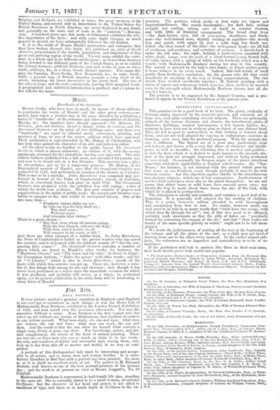Handbooks of the Oratorios.
Messrs. Cocks, who have done so much, by means of cheap editions, to popularize the works of Handel and the other great oratorio-composers, have taken a further step in the seine direction by publishing a series of "handbooks" of the oratorios and other compositions of Handel, Haydn, Esc. Six numbers have already appeared—The Messiah, The Creation, Ads and Galatea, Israel in Egypt, Judas 3 1 accabalts and The Occasional Oratorio—at the price of two shillings each; and ;hese new "handbooks " are equal in editorial merit, correctness, printing, and neatness of form, to any of the octavo editions which have appeared. Their publication is superintended by Mr. Bishop of Cheltenham, who has long since gained the character of an able and judicious editor. All the above works are familiar to the public except 17te Occasional Oratorio, which is almost unknown ; no edition of it, with the accompaniments arranged for the pianoforte, having ever appeared. The only edition hitherto published was a full score, not calculated for popular use, and now to be found only in a few libraries. This oratorio was a pi'ece de eirconstance, got up for a temporary purpose. Mr. Bishop, in his biographical memoir of Handel, says that the Occasional Oratorio was composed in 1745, and performed on occasion of the victory at Culloden. This seems to be a mistake. Judas Maceaberus was composed and performed in honour of the Duke of Cumberland's victory at Culloden, which, as everybody knows took place in April 1746. victory Occasional Oratorio was produced while the rebellion was still raging ; a fact of which the words bear evidence: The first part consists of prayers and supplications in the midst of public peril; the second part breathes resolution to conquer or die, and exults in anticipated victory. One of the airs runs thus
" Prophetic visions strike my eve: In vain our foes for help shall. cry ; War shall cease ;
Welcome peace
And triumphs after victory." There is a great chorus " May God, from whom all mercies spring, Bless the true Church, and save the King With firm, united hearts, we all Will conquer in his cause or fall."
And there are other passages of a similar kind. In Judas Maccabeens, the Duke of Cumberland is hailed as the patriot warrior who has saved his country, and is welcomed with the jubilant sounds of s" See the conquering hero comes !" The Occasional Oratorio contains a number of pieces which are found in Handers other works : for instance, the "Hailstone Chorus" and "The horse and his rider," in Israel in Egypt; the Coronation Anthem, " Zadoc the priest," with other words ; and the air "0 Liberty," which is also in Judas Maceabecus : proofs of the haste with which this oratorio was got up. There are, however, a number of fine things both among its airs and choruses ; and, though it has never been performed as a whole since the immediate occasion for which it was produced, and probably will never, as a whole, be performed again, yet its present publication in its entire form will be interesting to every lover of Handel.


























 Previous page
Previous page